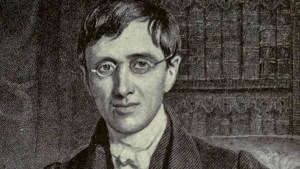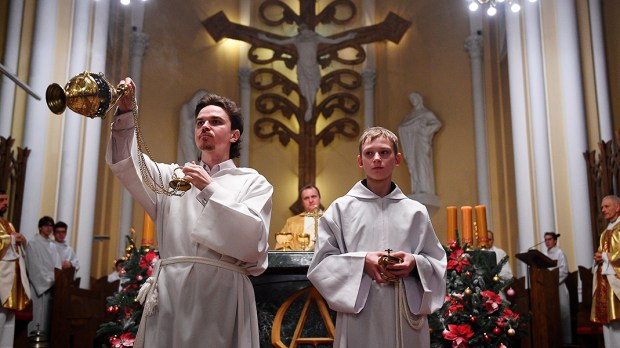If we were to learn about Christmas from movies and malls it wouldn’t be about much more than Mariah Carey’s breathy vocals, hot chocolate, the sparkle of snowflakes, and couples kissing as they ice skate. All those things are nice, but they are not Christmas. Neither is Christmas the superficial glitz and empty commercialism that bursts into stores and onto screens from July to December.
So, if Christmas is not about these things, what is it about?
Christmas is about death.
Some will recoil at these words but Christmas is about more than cozy manger scenes. Christmas is a celebration of the God who humbled himself to the point of being born human, in poverty, and in a cave—a God-child destined not for earthly honors and riches but to die for us. Jesus was laid on the wood of a manger that foreshadowed the wood of the Cross.
Of course, we would like to separate the baby from the Cross because the Cross complicates our complacency. But this Child-God was not born in a vacuum. The entire context of his identity and life are what make his birth worthy of celebration.
Jesus was born to save us. He was born to die to save us.
Christ’s birth foreshadows his death, but Christmas also can be linked to Christ’s death more directly. Some scholars argue that the actual date of Christmas was set in direct relation to Christ’s death. In his book, The Spirit of the Liturgy, then-Cardinal Ratzinger explores theories that place Christ’s death on March 25. Because it was also commonly thought that Jesus was both conceived and died on the same day, it is thought that this was the reason Christmas was set nine months later. Connecting Jesus’ conception with Christmas makes sense. But to the ancient and medieval Christian mind, Christ’s conception and birth were inextricably bound up in his death.
Jesus’ death is wrapped up in every aspect of salvation history. The writings of the Church Fathers reflect this ancient Christian understanding that can so easily be erased from our minds and holiday parties:
Saint Irenaeus wrote that the Child Jesus was given myrrh “because it was he who should die and be buried for the mortal human race.”
Saint Augustine admonishes us, “Wake up O man—it was for you that God was made man! . . . Eternal death would have awaited you had he not been born in time. . . . You would not have come to life again had he not come to die your death. You would have perished had he not come.”
In a Christmas homily, Saint Leo the Great rejoices, “Our Savior, dearly-beloved, was born today: let us be glad. . . . because as our Lord, the destroyer of sin and death, finds no one free of guilt, so he comes to set all free.”

Read more:
2 Powerful lessons we can learn from Christmas, according to Blessed John Henry Newman
Christmas celebrations are full of life only because our Life came to save us from death through death. Life took on human life in order that he might die for us. What a joyous occasion!
What can we do to renew this understanding of Christmas’ relation to Christ’s death? We can begin by avoiding sentimentalizing Christmas and stripping it of the Cross. We can also remember our own deaths. Death could come for us at any time. Anyone who is grieving the sudden loss of a loved one at Christmastime knows this terrible and hopeful reality. Death also could come for any of us suddenly and swiftly. Advent and Christmas is a time to remember and prepare for the day when we will meet Jesus.
Remembrance of death—both Jesus’ and our own—is an integral part of Christmas. This is not morbid or sad news, it’s good news—very Good News!

Read more:
The Rosary: My direct line to Mary when evil threatens
~
Sr. Theresa Aletheia Noble, fsp is the author of Remember Your Death: Memento Mori Journal (available now) & Remember Your Death: Memento Mori Lenten Devotional (available for preorder).

